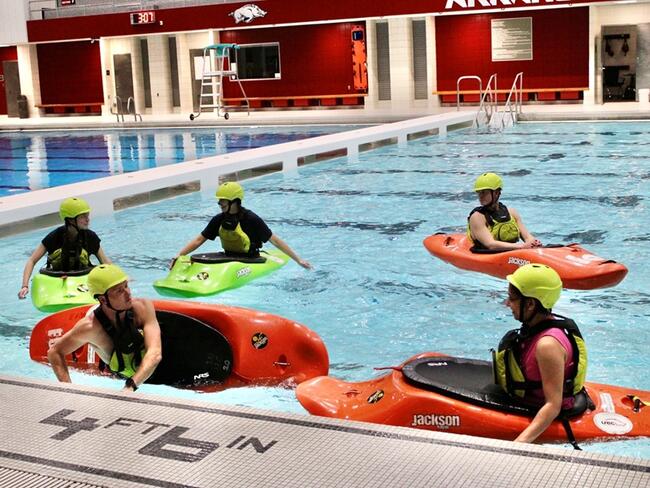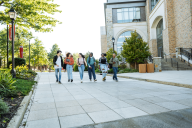You have /5 articles left.
Sign up for a free account or log in.

A partnership between student recreation and the counseling center help boost students’ confidence and self-efficacy through adventures and group therapy.
University of Arkansas Fayetteville/University Recreation + Wellness
When picturing group therapy, you might think of a circle of chairs in a crowded room and deep conversations about feelings. For a student with social anxiety, this can feel like torture.
At the University of Arkansas, Fayetteville, Counseling and Psychological Services (CAPS) offers students a new, effective way to engage with their feelings and their peers: adventure therapy groups.
Adventure therapy, which dates back to the 1930s, is a common form of treatment to promote a client’s confidence, personal growth and feelings of self-worth as well as build trust and communication within a group system. It’s primarily associated with wilderness therapy, which teaches students basic survival skills to build self-efficacy that they can apply to their academic studies.
“I’ve just had this strong interest in, how do we really foster that sense of connection, not just to, like, nature, to something outside of yourselves, but also to other people that are going through similar experiences?” says Amy Ference, a mental health clinician at CAPS. “It seemed to really fit into what we already do at University of Arkansas, which is a really strong focus on our groups program and our counseling center.”
What’s the need: Today’s college students report high levels of mental and emotional distress, with over three in four students saying they need help for emotional or mental health problems like feeling sad, blue, anxious or nervous and 65 percent of students saying they feel stressed often or all the time.
About half of students report experiencing chronic stress while in college.
All college students can benefit from this kind of interaction because they face challenges and stressors that put them at a higher risk of experiencing anxiety issues, Ference says. But students with social anxiety really benefit.
“We know that group therapy is the best possible treatment for things like social anxiety, and that social anxiety is going to stop you, oftentimes, from sitting in a room with strangers and just talking about the very, very personal things in their lives,” Ference says.
Adventure therapy provides a different modality, where students no longer are talking directly about their experiences, but instead focused on activities that they can relate back to their life.
How it works: CAPS partnered with University Recreation and Wellness (UREC) to offer the therapy group starting in spring 2024, thanks to grant funding from the Student Affairs Executive Leadership Board, made up of community leaders, alumni, parents and other professionals.
All UArk students are welcome to participate at no cost, and each group has between five to 12 members. After completing an intake appointment, students engage in weekly sessions with their peers.
Some lower-intensity activities are led by CAPS clinicians directly, including puzzles, games or walks on campus, whereas others are taught by UREC staff, including rock climbing, mountain biking or kayak rolling.
“Of the adventure beliefs that we have, one of them is fun,” Ference says. “That’s a really important element of it.”
The impact: The groups have helped students break out of their shell and feel more confident engaging with their peers and in life.
“One thing that’s been really important to us about using these interventions is to really get away from this traditional mindset of achievement as the goal of the activity,” Ference says, meaning that racing to the top of the climbing wall is not the goal, nor is successfully rolling the kayak. Instead, the goal is trying something new or challenging oneself in small ways. “Our clinicians are more focused on encouraging our participants to build a stronger connection to their own needs and desires, helping them really shift from that external to internal locus of control.”
Based on the initial three groups, more clinicians have added elements of adventure therapy into their sessions to help students open up. CAPS team members have also identified that adventure programming can happen on a shorter timeline because it breaks inhibitions students may have, allowing them to get vulnerable in intense activities.
Clinicians are collecting some data from students to gauge efficacy and impact of their work as part of the grant funding through surveys and assessments.
Ference also hopes to better connect with other clinicians who provide adventure therapy to college students, a network she says has been less prevalent since the COVID-19 pandemic and remote instruction, because of the opportunities this type of treatment has for student anxieties.
Do you have a wellness tip that might help others encourage student success? Tell us about it.








